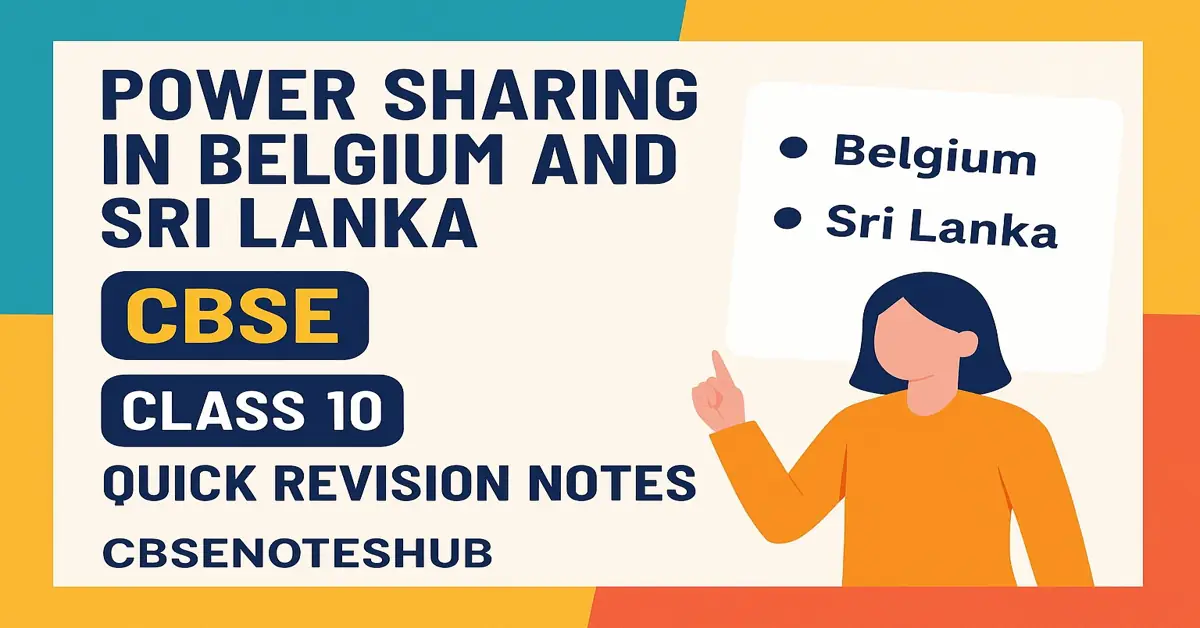“This post explains the concept of power sharing with practical examples from Belgium and Sri Lanka, showing how both countries handled language diversities and what the outcome was.”
Power Sharing – Belgium and Sri Lanka | Class 10 Notes
Power Sharing in Belgium
- Belgium is a small country in Europe.
- Area: Smaller than the Indian state of Haryana.
- Borders: France, Netherlands, Germany, and Luxembourg.
- Population: A little over one crore.
- Ethnic composition: Very complex.
Population divided into:
- Dutch-speaking – Flemish region (59%)
- French-speaking – Wallonia region (40%)
- German-speaking – 1%
Brussels (Capital of Belgium):
- 80% people speak French.
- 20% people speak Dutch.
Minority and Majority Tensions:
- French-speaking: Minority in the country, majority in Brussels.
- Dutch-speaking: Majority in the country, minority in Brussels.
- Tension due to economic gap and power imbalance.
Accommodation of Diversities (1970–1993):
- Four constitutional amendments introduced.
- Equal ministers in the central government from both communities.
- Special laws require support of both communities.
- State governments are no longer subordinate to the central government.
- Brussels has a separate government with equal representation.
- Community government: Elected by people of one language group.
- Responsible for cultural, educational, and language matters.
Results of the Belgian Model:
- Helped avoid civil strife.
- Prevented division on linguistic lines.
- Brussels became the headquarters of the European Union.
- Belgium remained united by respecting all communities.
📘 Must Read: Romantic Imagination and National Feeling – Class 10 History Notes (Part 4)
Power Sharing in Sri Lanka
- Independence: 1948.
- Location: Island nation south of India.
- Population: About 2 crore.
Major Ethnic Groups:
- Sinhala speakers – 74% of the population.
- Tamil speakers – 18% of the population.
Tamils further divided into:
- Sri Lankan Tamils – Tamil natives of the country.
- Indian Tamils – Came from India as plantation workers.
Distribution:
- Sri Lankan Tamils are concentrated in the north and east.
Religion:
- Sinhala speakers – Buddhist.
- Tamils – Hindu or Muslim.
- Christians – 7% of the population, speak both Tamil and Sinhala.
Majoritarianism in Sri Lanka:
- Post-independence government adopted measures for Sinhala supremacy.
1956 Act:
- Made Sinhala the only official language.
- Declared Buddhism the official religion.
Preference given to Sinhalas in:
- Government jobs.
- University admissions.
Impact on Sri Lankan Tamils:
- Felt alienated.
- Denied equal rights.
- Constitution did not protect their interests.
Demands of Sri Lankan Tamils:
- Recognition of Tamil as an official language.
- Regional autonomy.
- Equality of opportunity.
By 1980:
- Political organisations formed demanding Tamil Eelam.
- They wanted independence in the north and east.
Consequences of Distrust Between Communities:
- Civil war broke out.
- Thousands killed from both sides.
- Families forced to leave as refugees.
- Many lost their livelihoods.
Source: NCERT
📌 Also Read:
Unification of Germany, Italy and Britain – Class 10
Visualising the Nation – Class 10 History Notes

